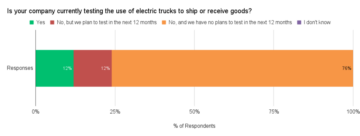
24 years ago today, I started a new job.
I arrived at the office expecting to start a research project related to the semiconductor industry (where I had spent most of my career at that point, and what I had been hired to do). Instead, I was told that I would do a market study on transportation management systems.
“What the heck is a TMS?!” was my immediate thought. (Okay, I didn’t actually say “heck” in my head; being from Brooklyn, I used a more colorful word.)
As the saying goes, the rest was history, and here I am 24 years later, now the founder of my own market research company, still trying to define Transportation Management Systems.
—
Moving on, here’s the supply chain and logistics news that caught my attention this week:
“Green is Good For Business” (Unless You Have to Pay for It)
As the Wall Street Journal reported last month, “The second annual [Corporate Climate Responsibility Monitor] report examining the net-zero plans of climate-leading global companies found little improvement over the last year as their self-reported decarbonization plans continue to fall well behind the stated ambitions to cut their emissions.”
In a survey we conducted last week with our Indago supply chain research community, most of our member respondents were not surprised by this news (Indago members can download the report from our website). As one executive commented:
“Many sustainability objectives are in direct conflict with our customer desires (e.g., low prices, early deliveries). Also, it is nearly impossible to meet California Air Resources Board (CARB) mandates since equipment and infrastructure either do not yet exist, have very long lead times, or are so expensive — even with subsidies — that it’s difficult to justify the investment.”
This sentiment was echoed in another WSJ article published this week, where Paul Berger reports that “Freight operators are rolling out a growing array of options for shippers looking to reduce pollution, from low-carbon aviation and marine fuels to electric trucks. But some shipping executives say companies are proving reluctant to pay the higher prices for alternative fuels and zero-emissions vehicles that can easily double or triple transport costs.”
Here’s the money quote from the article
“Some [customers] are willing to pay to reduce their emissions,” [Bill Bliem, senior vice president of fleet services at NFI] said. “Others, when you tell them the cost, say: ‘Well, we want to be green, but we don’t know that we can afford to be green.’”
To paraphrase lyrics from the song “How To Be A Millionaire” by the band ABC, it seems like many companies at the moment are singing, “I’ve seen the [sustainability] future, I can’t afford it.”
Drones, Robots, and Autonomous Trucks, Oh My!
Speaking of the future, it’s already here (or getting closer and closer) when it comes to drones, robots, and autonomous trucks.
On the drones front, Zipline this week unveiled “its new platform that provides quiet, fast and precise autonomous delivery directly to homes in cities and suburbs.” According to the press release:
Unlike other drone delivery services, Zipline’s drones (Zips) fly more than 300 feet above the ground and are nearly inaudible. When the Zip arrives at its destination, it hovers safely and quietly at that altitude, while its fully autonomous delivery droid maneuvers down a tether, steers to the correct location, and gently drops off its package to areas as small as a patio table or the front steps of a home. This is all made possible through major innovations in aircraft and propeller design.
Here’s a short video demonstrating a drone delivering a box of spaghetti to a happy suburban family:
[embedded content]
Okay, we’ve seen plenty of videos like this in the 10+ years since I wrote “Drones – The Birth Of A New Transportation Mode” in February 2013. The reality is that if you need a box of spaghetti right now, you still need to get in your car, drive to the supermarket or corner convenience store, and get it yourself (or you order it from a service like Gopuff and have it delivered the old fashion way — by car or van). Drone technology might be advancing forward, but everything else (like regulations) to make drone delivery in cities and suburbs a reality is moving much, much slower.
Drones and robots for inventory management, however, have fewer hurdles to overcome.
Verity AG, “creators of the first commercially successful inventory tracking solution powered by fully autonomous indoor drones,” announced that it completed a 30M CHF ($32M USD) Series B funding round. Here are some excerpts from the press release:
This funding allows Verity to quickly scale up operations to address the growing backlog of deployments with systems already installed in 30 sites across 13 countries on 3 continents.
Supply chain automation has become a top priority for third-party logistics providers (3PLs), retailers, and manufacturers to address business-critical logistics challenges. Inventory management is a prime use case for automation: manual inventory scanning is costly and laborious, and errors frequently lead to lost productivity and sales. Verity’s system allows users to fully automate the manual scanning process, using self-flying warehouse drones that require no operator and can fly in the dark.
And on the robots-for-inventory-management front, as Emily Crowe reports in Progressive Grocer, “In an effort to get greater visibility into club conditions and gain deeper business insights, BJ’s Wholesale Club is rolling out Simbe Robotics’ business intelligence solution Tally across its 237-store footprint…Tally rolls down club aisles multiple times per day and leverages AI and computer vision technology to collect shelf data and help ensure products are in stock, shelved correctly and accurately priced. The autonomous robot will allow BJ’s associates to refocus more of their time toward other tasks and helping customers.”
Now if we could only get shopping carts with wheels that don’t stick.
I expect to see plenty of robots in action next week at ProMat. I’ll be speaking on “Warehouse Robots: What We’ve Learned,” where I’ll share some insights from our Indago supply chain research community. The presentation will be on Tuesday, March 21 at 3:30 pm at the Locus Robotics booth (#S2303). If you’re attending ProMat, I hope to see you there!
And with that, have a happy weekend.
Song of the Week: “Better Be Home Soon” by Crowded House
[embedded content]
- SEO Powered Content & PR Distribution. Get Amplified Today.
- Platoblockchain. Web3 Metaverse Intelligence. Knowledge Amplified. Access Here.
- Source: https://talkinglogistics.com/2023/03/17/above-the-fold-supply-chain-logistics-news-march-17-2023/
- :is
- $UP
- 2023
- a
- ABC
- above
- According
- accurately
- across
- Action
- actually
- address
- afford
- AG
- AI
- AIR
- aircraft
- All
- allows
- already
- alternative
- ambitions
- and
- and infrastructure
- announced
- annual
- Another
- ARE
- areas
- Array
- Arrives
- article
- AS
- At
- attending
- attention
- automate
- Automation
- autonomous
- autonomous delivery
- autonomous trucks
- aviation
- BAND
- BE
- become
- behind
- being
- Berger
- Bill
- birth
- board
- Box
- Brooklyn
- business
- business intelligence
- by
- california
- CAN
- car
- Career
- case
- caught
- chain
- challenges
- chf
- Cities
- Climate
- closer
- club
- collect
- colorful
- commented
- commercially
- Companies
- company
- Completed
- computer
- Computer Vision
- conditions
- conducted
- conflict
- content
- continue
- convenience
- Corner
- Corporate
- correctly
- Cost
- Costs
- could
- countries
- customer
- Customers
- Cut
- Dark
- data
- day
- decarbonization
- deeper
- delivered
- Deliveries
- delivering
- delivery
- Delivery Services
- demonstrating
- deployments
- Design
- destination
- difficult
- direct
- directly
- Dont
- double
- down
- drive
- drone
- drone technology
- Drones
- Drops
- e
- Early
- easily
- effort
- either
- Electric
- embedded
- Emissions
- ensure
- equipment
- Errors
- Even
- everything
- Examining
- executive
- executives
- expect
- expecting
- expensive
- Fall
- family
- Fashion
- FAST
- February
- Feet
- First
- FLEET
- For
- Forward
- found
- founder
- frequently
- from
- front
- fuels
- fully
- funding
- Funding Round
- future
- Gain
- get
- getting
- Global
- Goes
- good
- greater
- Green
- Ground
- Growing
- happy
- Have
- head
- help
- helping
- here
- higher
- history
- Home
- Homes
- hope
- However
- HTTPS
- Hurdles
- i
- I’LL
- immediate
- impossible
- improvement
- in
- Indoor
- industry
- Infrastructure
- innovations
- insights
- installed
- instead
- Intelligence
- inventory
- Inventory Management
- investment
- IT
- ITS
- Job
- journal
- jpg
- Know
- Last
- Last Year
- lead
- learned
- leverages
- like
- little
- location
- logistics
- Long
- looking
- Low
- low prices
- low-carbon
- made
- major
- make
- management
- mandates
- manual
- Manufacturers
- many
- March
- Marine
- Market
- market research
- Meet
- member
- Members
- might
- moment
- money
- Monitor
- Month
- more
- most
- moving
- multiple
- nearly
- Need
- net-zero
- New
- New Platform
- news
- next
- next week
- objectives
- of
- Office
- Okay
- Old
- on
- ONE
- Operations
- operator
- operators
- Options
- order
- Other
- Overcome
- own
- package
- Paul
- Pay
- plans
- platform
- plato
- Plato Data Intelligence
- PlatoData
- player
- Plenty
- Point
- Pollution
- possible
- powered
- precise
- presentation
- president
- press
- Press Release
- Prices
- Prime
- priority
- process
- productivity
- Products
- progressive
- project
- providers
- provides
- published
- quickly
- quietly
- Reality
- reduce
- regulations
- related
- release
- report
- Reports
- require
- research
- Resources
- responsibility
- REST
- retailers
- robot
- robots
- Rolling
- rolls
- round
- safely
- Said
- sales
- Scale
- scanning
- Second
- seems
- semiconductor
- senior
- sentiment
- Series
- Series B
- service
- Services
- Share
- Shelf
- Shipping
- Shopping
- Short
- since
- Sites
- small
- So
- solution
- some
- speaking
- spent
- start
- started
- stated
- Steps
- Stick
- Still
- stock
- store
- street
- Study
- successful
- supply
- supply chain
- surprised
- Survey
- Sustainability
- system
- Systems
- table
- Tally
- tasks
- Technology
- Tether
- that
- The
- The Future
- The Wall Street Journal
- their
- Them
- third-party
- this week
- thought
- Through
- time
- times
- to
- today
- top
- toward
- Tracking
- transport
- transportation
- Triple
- Trucks
- Tuesday
- unveiled
- USD
- use
- use case
- users
- Vehicles
- Verity
- Vice President
- Video
- Videos
- visibility
- vision
- Wall
- Wall Street
- Wall Street Journal
- Warehouse
- Way..
- Website
- week
- weekend
- WELL
- What
- while
- wholesale
- will
- willing
- with
- Word
- would
- WSJ
- year
- years
- Your
- yourself
- youtube
- zephyrnet
- Zip
- zipline




![[Video] Beyond Control Tower: How Cognitive Command Centers Are Revolutionizing Supply Chains](https://platoaistream.net/wp-content/uploads/2023/08/video-beyond-control-tower-how-cognitive-command-centers-are-revolutionizing-supply-chains.jpg)







